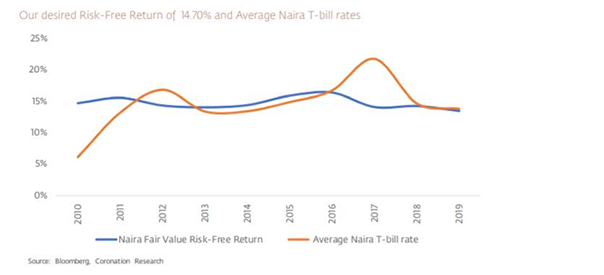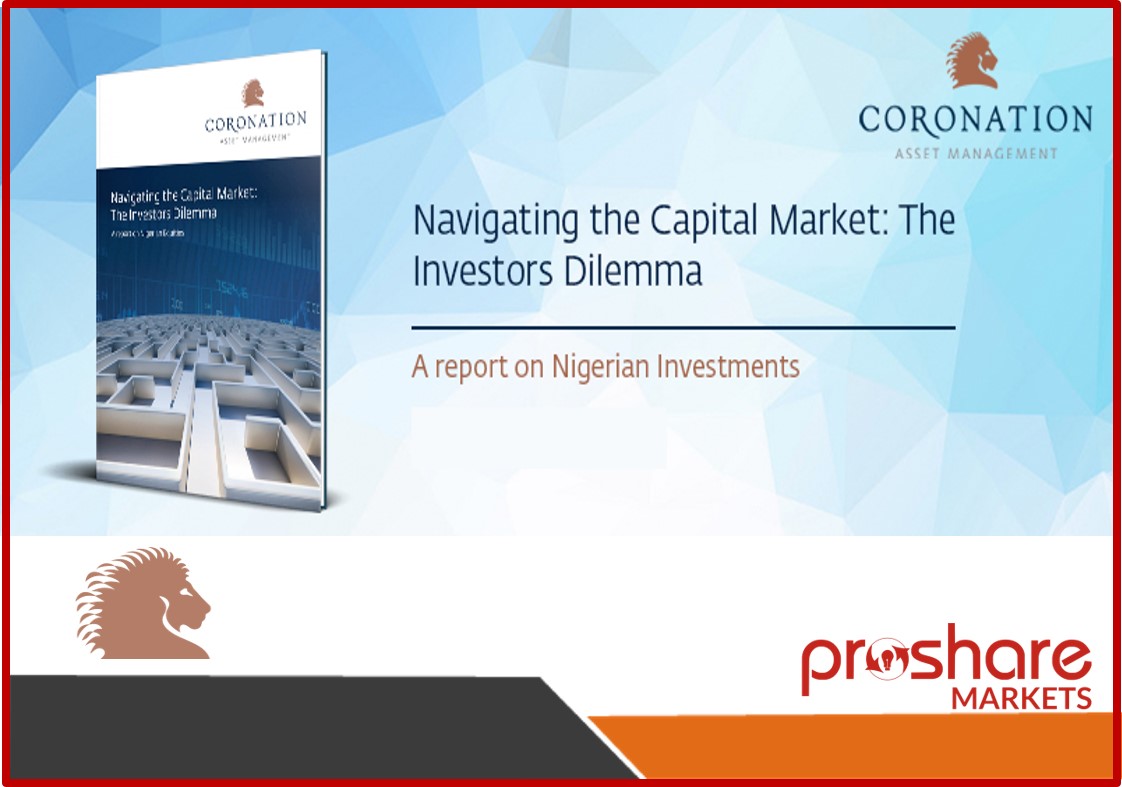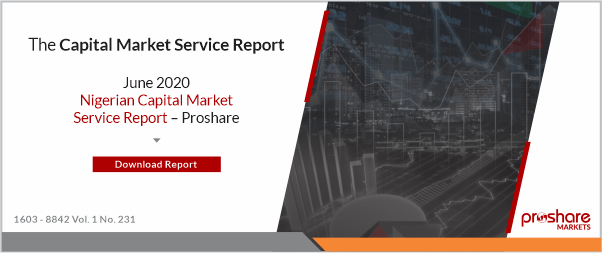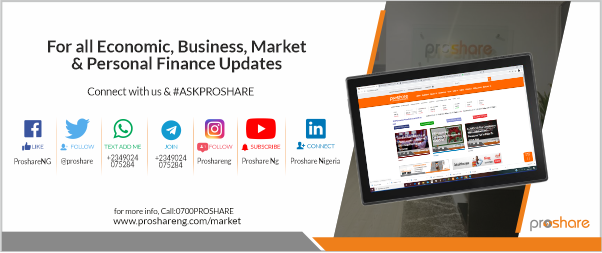Tuesday, July 14, 2020 / 05:34PM / by Coronation Research / Header Image Credit: Coronation Research
Executive Summary
How much should our Naira investmentsreturn?
When we talk with investors two concerns frequentlycome up. One is inflation: "How can our investments beat inflation?". The otheris Naira devaluation, not so much because of its direct impact (devaluations donot directly impact Naira investments) but because of the business disruptionthat devaluations cause.
In this report we treat these two problems asessentially the same thing. It is the difference between US dollar inflationand Naira inflation that drives periodic Naira devaluations. Therefore, thefirst job of a Naira investment is not to beat inflation as such, but to beatthe difference between US dollar inflation and Naira inflation. This creates areturn which, in the long run, is the equivalent of a zero return in USdollars.
Once an investment can do that, the next task is toprovide a US dollar return, which is conveniently provided by Nigeria'ssovereign Eurobonds. Add the two rates together and we come to the followingconclusion for Naira investors:
You should start by insisting on a 14.70% per annumrisk-free return.
Do Nigerian T-bills return enough?
T-bills come remarkably close to delivering ourdesired risk-free return, at least over the long term. They only fall a littleway short of it. And, to the satisfaction of inflation-focused investors, theybeat inflation over the long term (though that is not the point, in our view).

Why doT-bills come so close to delivering a sovereign US dollar return? It may be thecase that Nairabased investors have been able to access US dollar-denominatedNigerian sovereign Eurobonds for long enough that a close yield relationshiphas been established. Or some other invisible hand may be at work. At any rate,the T-bill rates seen during the first half of 2020, like those in 2010, appearto be an aberration - very different to the long-term pattern.
What should Nigerian equities return?
Nigerianequities have not been an inspiring story, and it is easy to show how poorlythey have underperformed other equity indices around the world. All the same,it is worth digging into why this is so. Clearly, there must be a benchmark, interms of profitability, which listed Nigerian companies fail to match (ingeneral - there are always exceptions).
What isthis benchmark? Following on from our desired 14.70% risk-free return, we addan equity risk premium (equities are risky) and come to the followingconclusion:
TheReturn on Equity (RoE) of Nigerian companies should average at least 20.53% perannum, over time.
Do listed companies have 20.53% RoE?
For themost part, the major listed companies of the Nigerian Stock Exchange All-ShareIndex (NSE ASI) do not return what we consider an adequate - 20.53% - RoE.There are notable exceptions and several bank stocks deliver returns above thislevel, while other bank stocks are trending towards this level.
Bycontrast, many industrial companies have reported steeply declining returnsover the past 10 years, disappointing a generation of investors in Nigerianindustry. If, 10 years ago, we had adopted the maxim 'Invest in industrialcompanies with high RoEs', we would have lost a sizeable part of our investment.Lack of growth destroyed RoEs and stock prices.
Stock price returns
Therefore,strong stock price performances have been like hen's teeth over the long term.While in each year there are usually a few strong performances driven bycorporate finance activity (takeovers, recapitalisations and the like), overthe long term - and we chose the 10 years from 2010 to 2019 inclusive - stockperformance has been hard to find.
Andthere is something sinister going on. We would expect a consistent 20.53% perannum RoE to be rewarded with roughly commensurate 20.53% stock priceappreciation. But many companies with high shareholder returns have failed todeliver stock price returns of the same order. This is because the market hasbeen de-rating these stocks, over time paying lower and lower multiples fortheir earnings. We cite several bank stocks as examples.
Thiseither means that Nigerian companies will continue to de-rate, or that a slewof Nigerian bank stocks are outstanding value, assuming that the market will infuture rate them as highly as they have been in the past. Given the post-2008decline in bank ratings, and the threat of FinTech to the sector, thisassumption is open to challenge.
Nothing for it but to trade
All isnot lost. Investors have enough faith in the earnings of several NSE-listedcompanies (not just banks but telecoms and some industrials) to buy them wheneconomic recovery and rising future earnings are in prospect, and to sell themwhen prospects worsen. Buying those stocks with strong RoEs when theirvaluations are depressed is still a reasonable, and potentially money-makingtactic. The current period is a good example.
So, weset out our stall. Understand the importance of receiving a 14.70% risk-freerate; look for equities to have a RoE of 20.53%; buy good stocks when theirvaluations are depressed. There is no guaranteed formula for making money:these are our guidelines.
Related Links
- NCM2020 - Fin. MKT in Transition: Understanding Past Uncertainties; Preparing for New Possibilities
- Surviving Uncertain Times in the Nigerian Financial Market
Related News - CapitalMarket
1. Inflation, KeyConcerns of Nigerian Investors - Coronation Asset Management
2. Sam Onukwue To Speak On ASHON Activities andNigeria's Capital Market Development
3. The Imperatives of Handbook for Financial MarketOperators and Practitioners - By Seye Adetunmbi
4. STACO, FTNCOCOA and 11 Others Default in PostFirst Deficiency Notification For Q1 2020 UFS
5. Value Investing Limited Hosts Zoom Presentationof a Newly Published Book on the Financial Market
6. How Nigeria's Financial Market Can CreateInvestment Opportunities For Millennials - Tomie Balogun
7. Coronanomics (28) - Nigerian Equity and FixedIncome Markets
8. Wale Olusi To Speak On H2, 2020 Outlook for TheNigerian Capital Market
9. NSE Reveals Results of Half Year 2020 Review ofMarket Indices
10. Margaret Agbonlahor To Speak on CollectiveInvestment Schemes Tomorrow on WebTV
11. Coronation Capital organizes 2nd Edition of itsCorporate Finance and Business Valuation Training
Related News - Bonds and Fixed Income
- Gold Jumps Past $1,700 Level as Coronavirus Fears Spur Haven Demand
- Average Yield Rises 2bps WoW Due to Tight System Liquidity
- Drab Day in Fixed Income Space Despite the Ease in System Liquidity
- Sigh of Relief as CRR Refund and SWAP Maturities Inflows Boost Interbank System Liquidity
- Money Market Rates Remain Stressed As Local Banks Queue Up For Liquidity From The CBN
- OMO Bears Emerge As Annual AMCON Charge Further Squeezes System Liquidity
- System Liquidity Crashes Into Negative Territory, Freezing Trading Activities In the FI Space
- CBN Adjusts Naira Value to N380 per Dollar at the Secondary Market Interventions Sale
- Strong Demand Persists at PMA; Average Yield Declines 15bps WoW
- Calm Day in the Bonds Market, as Market Demand Shifts to Head of the Curve
 Lagos, NG • GMT +1
Lagos, NG • GMT +1











 1228 views
1228 views












 Sponsored Ad
Sponsored Ad
 Advertise with Us
Advertise with Us









